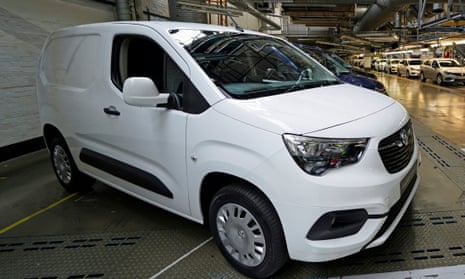
Vauxhall maker says Brexit deal must be renegotiated or it could shut UK plant
Stellantis says it can no longer meet trade rules on sourcing of parts in Britain or EU after rise in raw material costs
The Vauxhall and Fiat manufacturer Stellantis has urged the government to renegotiate rules in the Brexit deal that it says could force it to shut some of its UK operations, putting thousands of jobs at risk.
The world’s fourth-biggest carmaker, which also produces Citroën and Peugeot vehicles, said only two years ago that the future of its electric car plants in Ellesmere Port and Luton were safe.
However, it now says it can no longer meet rules in the Brexit trade deal that require 45% of parts by value to be sourced in the UK or EU by 2024, after a rise in raw material costs used in electric car batteries during the coronavirus pandemic and the energy crisis.
This means electric vans made at the Ellesmere Port site will face tariffs of 10% when exported to mainland Europe from next year because they do not have enough locally sourced parts, putting the future of the plant at risk, the company said.
Ellesmere Port, which is due to start electric vehicle production later this year, employs 1,000 workers, while 1,200 are employed in Luton making Vauxhall and Fiat vans. Thousands more people are employed in the UK in businesses linked to the plants.
The car industry has long warned that it faces a race against time to comply with the terms of the Brexit deal because the cost of batteries takes up such a large proportion of the value of electric cars. Most electric car batteries are made in Asia, and a flurry of new European factories may not open fast enough to meet soaring demand.
Stellantis’s comments are the first explicit call by a carmaker for a renegotiation of the Brexit deal to give it more time to comply.
“To reinforce the sustainability of our manufacturing plants in the UK, the UK must consider its trading arrangements with Europe,” Stellantis said, in a submission to a House of Commons inquiry into electric car production first reported by the BBC. It cited extra costs for the UK if it were forced to import batteries, adding: “If the cost of EV manufacturing in the UK becomes uncompetitive and unsustainable operations will close.”
Bosses from the manufacturer are due to meet the business secretary, Kemi Badenoch, on Wednesday to discuss the issue. The company also wants arrangements for manufacturing parts in Serbia and Morocco to be reviewed.
The trade deal is due to be renegotiated in 2025 as part of the original pact between the UK and the EU signed by Lord Frost in December 2020.
The Labour leader, Keir Starmer, said the UK needed to improve the Brexit deal. He told the BBC’s Breakfast programme: “Look, we’re not going to re-enter the EU. We do need to improve that deal. Of course we want a closer trading relationship, we absolutely do.
“We want to ensure that Vauxhall and many others not just survive in this country but thrive, because there are jobs bound up – there are families watching this morning either employed by Vauxhall or a similar place who are deeply worried about what this means.
“So, yes, we need a better Brexit deal. We will make Brexit work. That doesn’t mean reversing the decision and going back into the EU but the deal we’ve got, it was said to be oven-ready; it wasn’t even half-baked.”
after newsletter promotion
Stellantis has asked for a renegotiation of the Brexit deal to avert a “threat to our export business and the sustainability of our UK manufacturing operations”. It said the government needs to reach an agreement with the EU to keep the existing rules as they are until 2027.
The effect of the rules of origin changes on individual carmakers varies between carmakers. Adrian Mardell, the boss of Jaguar Land Rover, last week said the future of its British factories did not depend on sourcing batteries from the UK, as its Indian owner, Tata, prepares to choose between the UK and Spain for a “gigafactory” to make batteries.
However, one car industry expert said Stellantis’s problems may stem from its decision to source batteries initially from China’s CATL, the world’s largest battery maker. Stellantis’s submission noted that it planned to “source batteries from mainland Europe and China”.
A government spokesperson said Badenoch “has raised this with the EU”.
The chancellor, Jeremy Hunt, said on Wednesday: “Everyone is trying to develop supply of EV batteries, and so we need to have that supply here in the UK. The closer it’s located to the factories that are making the rest of the car, the better.
“And all I would say is, watch this space, because we are very focused on making sure the UK gets that EV manufacturing capacity.”